|
|
|
Sort Order |
|
|
|
Items / Page
|
|
|
|
|
|
|
| Srl | Item |
| 1 |
ID:
104044
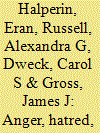

|
|
|
|
|
| Publication |
2011.
|
| Summary/Abstract |
Anger is often viewed as a destructive force in intergroup conflicts because of its links to aggressive behavior. The authors hypothesized, however, that anger should have constructive effects in those with low levels of hatred toward the out-group. Using experimental designs with subsamples of nationwide representative surveys, the authors conducted two studies within the context of the Israeli-Palestinian conflict. Study 1 showed that inducing anger toward Palestinians several weeks before the Annapolis summit increased support for making compromises in upcoming negotiations among those with low levels of hatred but decreased support for compromise among those with high levels of hatred. Study 2 showed that, even when a strong anger induction was used just days before the summit, the anger induction led to increased support for compromise among those low in hatred, but not among those high in hatred. The authors discuss the implications of these findings for informing a psychological understanding of conflicts.
|
|
|
|
|
|
|
|
|
|
|
|
|
|
|
|
| 2 |
ID:
150993
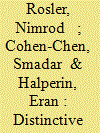

|
|
|
|
|
| Summary/Abstract |
The goal of the current research was to examine how discrete positive intergroup emotional phenomena affect conflict-related attitudes in different contexts of intractable conflict. We hypothesized that empathy, but not hope would be negatively associated with aggressive attitudes during escalation, while hope, but not empathy would be associated with conciliatory attitudes during de-escalation. In study 1, we examined our hypotheses within a correlational design in an emotion-inducing context, while in study 2 a two-wave survey was conducted during real-life events within the context of the Israeli–Palestinian conflict; a peace summit as well as a war. Both studies supported our hypotheses, thus indicating the unique, yet complimentary, contribution of each of the two emotional phenomena to the advancement of peace.
|
|
|
|
|
|
|
|
|
|
|
|
|
|
|
|
| 3 |
ID:
188828
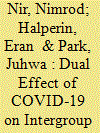

|
|
|
|
|
| Summary/Abstract |
The coronavirus pandemic has fundamentally shifted the way human beings interact, both as individuals and groups, in the face of such a widespread outbreak. This paper seeks to investigate the effects of COVID-19 on intergroup emotions and attitudes within an intractable intergroup conflict, specifically, through the lens of the Korean conflict. Using a two-wave, cross-sectional design, this study was able to track the profound psychological changes in intergroup emotions and attitudes both prior to the pandemic and during its onslaught. Results of these two wave representative samples show that South Korean citizens demonstrated higher levels of fear of their neighbors in North Korea after the outbreak of COVID-19 than before. In turn, this led to increased societal support of hostile government policies towards North Koreans. Conversely, the same participants exhibited higher levels of empathy towards North Koreans during the pandemic, which led to a higher willingness to collaborate with their outgroup. This dual effect on intergroup emotions within intractable conflicts brings forth new avenues from which societies may be able to restrain the destructive influence of the COVID-19 threat on intergroup relations — as well as harvesting its constructive potential for reconciling warring intergroup relations.
|
|
|
|
|
|
|
|
|
|
|
|
|
|
|
|
| 4 |
ID:
137114
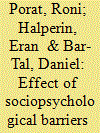

|
|
|
|
|
| Summary/Abstract |
During protracted intractable conflicts, society members develop a sociopsychological infrastructure that leads to selective and biased information processing, obstructing the penetration of new information that may facilitate peacemaking. To validate a process model that depicts the functioning of these barriers, we conducted a study among 207 Israeli Jews, focusing on the effects of long-term barriers on information processing. After measuring these barriers, we introduced an invented peace proposal and gave participants the option of processing additional information concerning its implications using the Decision Board Platform. Aided by this platform, we conducted an in-depth analysis of information acquisition strategies and found that four general worldviews (i.e., traditional and universal values, incremental theory, and authoritarianism) were associated with the ethos of conflict, which in turn was associated with the general amount and type of information processed. The theoretical and applied implications are discussed.
|
|
|
|
|
|
|
|
|
|
|
|
|
|
|
|
| 5 |
ID:
134463
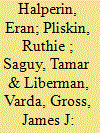

|
|
|
|
|
| Summary/Abstract |
The goal of the current project is to integrate psychological research on emotion regulation with the study of democratic practices in general and political intolerance in particular. We hypothesized that the use of a well-established emotion regulation strategy, cognitive reappraisal, would be associated with lower levels of group-based negative emotions toward one’s least-liked group and lower levels of political intolerance toward that group. Preliminary data based on nationwide survey conducted among Jews in Israel show that the tendency to reappraise negative emotions during war is associated with more tolerant attitudes. In studies 1 and 2, we experimentally manipulated reappraisal, and this led to reduced levels of political intolerance toward Palestinian Citizens of Israel (study 1) and toward one’s least-liked group (study 2). These effects were transmitted via a decrease in negative emotions in both studies, as well as by an increase in support for general democratic values in Study 2.
|
|
|
|
|
|
|
|
|
|
|
|
|
|
|
|
| 6 |
ID:
083750
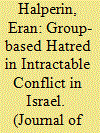

|
|
|
|
|
| Publication |
2008.
|
| Summary/Abstract |
Countless theoretical texts have been written regarding the centrality of hatred as a force that motivates intergroup conflicts. However, surprisingly, at present, almost no empirical study has been conducted either on the nature and character of group-based hatred or on its implications for conflicts. Therefore, the goal of the current work has been to examine the nature of group-based hatred in conflicts. Three studies were conducted within the context of the Israeli-Palestinian conflict. The first was a qualitative study, which aimed at creating a preliminary platform for investigation of specific features of group-based hatred. Studies 2 and 3 used various scenarios and survey methods to indicate the appraisal and the behavioral aspects of group-based hatred and to distill them from those of other negative emotions, such as anger or fear. In general, results show that hatred is a distinct emotion that includes a unique cognitive-appraisal component and specific emotional goals.
|
|
|
|
|
|
|
|
|
|
|
|
|
|
|
|
| 7 |
ID:
173136
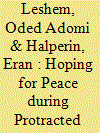

|
|
|
|
|
| Summary/Abstract |
Hope is an essential component in the pursuit of political change. In order to hope, citizens need to wish for the change and have some expectations that it could materialize. This article explores how the two components of hope (i.e., wishes and expectations) are constructed in the seemingly hopeless case of a protracted and violent conflict. Utilizing a large-scale survey administered in Israel, the West Bank, and the Gaza Strip, we show that citizens’ appraisals of their adversary’s wishes and expectations for peace affect their own wishes and expectations, which, in turn, influences their willingness to support peacebuilding efforts. Regrettably, citizens’ tendency to underestimate their rival’s wish for peace lessens their own hopes, which further abates the support for peacebuilding. The study is the first to illustrate a mechanism by which hope for peace is constructed and the pathways by which hope facilitates resolution. Theoretical and applied implications are discussed.
|
|
|
|
|
|
|
|
|
|
|
|
|
|
|
|
| 8 |
ID:
166003
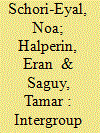

|
|
|
|
|
| Summary/Abstract |
Despite their pernicious effect on intergroup conflict, collateral casualties are seen as inevitable and justified by many members of the groups involved, particularly those who endorse a right-wing ideology. Drawing on social psychological literature, we examined whether a perception of commonality between in-group and out-group can be beneficial for reducing tolerance to collateral causalities. We hypothesized that viewing the out-group as sharing commonalities with the in-group can reduce processes of out-group delegitimization, which are common among right-wingers in intractable conflicts, and may therefore serve to explain reduction in tolerance to collateral casualties. Three correlational studies were conducted among Jewish-Israelis in the context of the conflict with the Palestinians to test this. In Study 1, right-wing political ideology was associated with stronger support for enemy collateral casualties, and the effect was moderated by perceived intergroup commonality. While leftists were overall non-supportive of collateral casualties, rightists who perceived high intergroup commonality were less tolerant of collateral casualties than those low on intergroup commonality. In Study 2, conducted during violent escalation, we replicated these results while controlling for anger, fear, and hatred. In Study 3, we found that the effect was mediated by delegitimization of the out-group. These results extend the range of beneficial impact of intergroup commonality, and imply that it may be used as a tool to promote conflict resolution.
|
|
|
|
|
|
|
|
|
|
|
|
|
|
|
|
| 9 |
ID:
143295
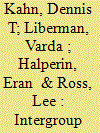

|
|
|
|
|
| Summary/Abstract |
Two studies examined the association of particular sentiments and political identities with Jewish-Israeli students’ responses to a generic plan to end the Israeli–Palestinian conflict and to narrower proposals for cooperative undertakings. Three composites—hatred/anger, compassion/empathy (reverse-coded), and guilt/shame (reverse-coded), and also a global composite combining these three sets of sentiments, were generally associated with negative responses to those plans and negative attributions about the wisdom and patriotism of supporters of those plans. Most of the associations between the global sentiments composite and the relevant responses continued to be statistically significant even after controlling for participants’ political identity. The interaction between the relevant sentiments and the putative authorship of one of the proposals was also investigated. Issues of generalizability, replicability, robustness, and of the relevance of mediational analysis, as well as implications for conflict resolution and potential directions for future research are addressed in a concluding discussion.
|
|
|
|
|
|
|
|
|
|
|
|
|
|
|
|
| 10 |
ID:
092053
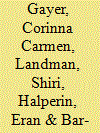

|
|
|
|
|
| Publication |
2009.
|
| Summary/Abstract |
One of the most important psychological barriers to conflict resolution is the rigid structure of the sociopsychological repertoire that evolves in societies immersed in intractable conflict. This article examines ways to overcome the rigidity of this repertoire in the context of the Israeli-Palestinian conflict. Specifically, in line with the prospect theory, the authors assumed that elicitation of beliefs about losses stemming from the continuing conflict may bring about a process of "unfreezing." To test this assumption, an exploratory study with a national sample of the Israeli-Jewish population and two subsequent experimental studies were conducted. The results demonstrated that exposure to information about losses inherent in continuing the conflict induces higher willingness to acquire new information about possible solutions to the conflict, higher willingness to reevaluate current positions about it, and more support for compromises than the exposure to neutral information or to information about possible gains derived from the peace agreement.
|
|
|
|
|
|
|
|
|
|
|
|
|
|
|
|
| 11 |
ID:
149477
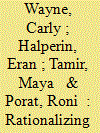

|
|
|
|
|
| Summary/Abstract |
How does accountability impact political decisions? Though previous research on accountability has demonstrated its potential effects in the realms of business, elections, and more, very little research has explored the effect of citizen accountability in highly ideological, intractable, and political conflicts. This article addresses this issue, looking at the unique interaction between accountability and ideology on Israeli citizens’ political attitudes regarding the Israeli–Palestinian conflict. The results of two experimental studies in Israel reveal that accountable individuals behave in significantly more ideologically partisan ways than their nonaccountable counterparts. Moreover, this polarization is dependent on the specific conflict context, with leftists more affected by the issue of negotiations and rightists by security concerns. This signals that ideological polarization under accountability may depend on the “issue ownership” each ideological group feels toward the specific conflict context and its corresponding social goal of projecting ideological consistency on these issues.
|
|
|
|
|
|
|
|
|
|
|
|
|
|
|
|
| 12 |
ID:
129797
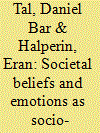

|
|
|
|
|
| Publication |
2014.
|
| Summary/Abstract |
An outsider observing the Israeli-Palestinian conflict might ask him or herself why, after so many attempts and initiatives have been placed on the negotiations table, the adversaries have failed to reach a settlement. Indeed, the "two-state solution" paradigm has been accepted by the majority of people in both societies for over a decade now (Bar-Tal, Halperin, & Oren, 2010), but the parties appear still far from reaching the desired resolution. Moreover, the solutions proposed over the years of negotiations by both officials and non-officials follow a similar paradigm and have in fact established clear contours to a possible peaceful resolution of the conflict. In fact, the Clinton Parameters from 2001, the Arab Peace Initiative from 2002, and Israeli Prime Minister Ehud Olmert's proposal from 2008 all identify the need to partition the land along the 1967 borders, transfer control of the eastern neighborhoods of Jerusalem to the Palestinians, find a fair solution to Jerusalem's holy sites, and formulate a just and agreed-upon solution to the Palestinian refugee problem (Lavie, 2010). Thus, one might ask: If the solution is so clear, what is holding the parties back?
|
|
|
|
|
|
|
|
|
|
|
|
|
|
|
|
| 13 |
ID:
107657
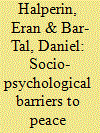

|
|
|
|
|
| Publication |
2011.
|
| Summary/Abstract |
Socio-psychological barriers play a major role in the continuation of intractable conflicts. They are responsible for the socio-psychological closure that resists and prevents the entertainment of alternative information that could potentially facilitate the acceptance of ideas advancing peacemaking processes. In an attempt to validate a process model that depicts the functioning of the socio-psychological barriers to conflict resolution, an empirical study was conducted among a nationwide representative sample of Jews in Israel, within the context of the Middle Eastern conflict. The reported study utilized a large scale survey, based on a nationwide representative sample of Israeli Jews who were asked to respond to a questionnaire which included the model's selected variables. As hypothesized, the results showed a path leading from general worldviews (e.g. General values, Right Wing Authoritarianism, Implicit theories about groups) to openness to new information and readiness to compromise through the mediation of the conflict-related societal beliefs (e.g. victimhood, delegitimization). These results indicate that closure to new information that may shed new light on both the rival and the conflict emerges as a crucial factor in the maintenance of society members' non-compromising views. The theoretical as well as the applied implications of the findings are discussed.
|
|
|
|
|
|
|
|
|
|
|
|
|
|
|
|
| 14 |
ID:
093602
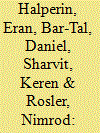

|
|
|
|
|
| Publication |
2010.
|
| Summary/Abstract |
Although prolonged occupation of a nation is no longer a common phenomenon, where it does exist, it bears harsh implications for all parties involved. This article examines the socio-psychological implications of occupation on the occupying society, using the case of the Israeli occupation of the Palestinian territories of the West Bank and Gaza Strip since 1967 as an example. The article first delineates the concept of occupation from a socio-psychological perspective, which supplements the legal-formal aspect. The authors then propose a conceptual framework that analyzes the psychology of the occupying society. Within this framework, they describe the psychological challenges that the occupation may pose to the members of the occupying society. Next, they introduce psychological mechanisms that members of an occupying society may use in order to avoid facing these challenges. Finally, they offer a number of ideas regarding the relationship between these mechanisms and the process of ending the occupation.
|
|
|
|
|
|
|
|
|
|
|
|
|
|
|
|
|
|
|
|
|